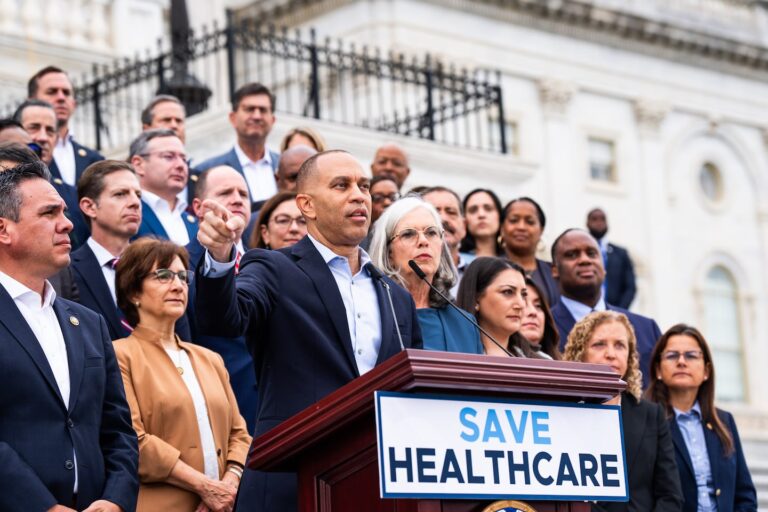The issue: Whether to extend expiring Affordable Care Act subsidies and roll back Medicaid cuts from the GOP’s “One Big Beautiful Bill Act.”
Democrats want both provisions in a funding deal to reopen the government. Republicans have refused, though some have signaled openness to negotiating on the subsidies — but only after Democrats agree to end the shutdown.
“Out of touch House Democrats voted to shut down the government to bankroll handouts for illegal immigrants and appease their radical base,” a Republican National Committee spokesman told the Globe’s Sam Brodey.
What it matters: In reality, the Democrats’ proposals would prevent millions of Americans from losing coverage or paying sharply higher premiums. They aren’t trying to give health care benefits to immigrants who are in the country illegally.
Step back: As part of a big COVID relief package in 2021, the Biden administration expanded eligibility for the ACA tax credits, making “Obamacare” policies on state and federal exchanges more affordable.
The changes increased financial assistance for lower-income buyers and expanded middle-income eligibility to nearly $63,000 in earnings for an individual and $129,000 for a family of four. After being extended in 2022, the subsidies are set to expire at the end of December because of budget rules.
The subsidies have contributed to the growing popularity of the ACA, with enrollment doubling since 2021 to more than 24 million. Participation more than tripled in several Trump-leaning states, including Georgia, Mississippi, Tennessee, and Texas.
Expiration date: Unless extended by Congress, the more generous tax credits will disappear after this year.
Kaiser estimates that the average ACA out-of-pocket premium would more than double next year to $1,900. The increase also reflects an expected average rate hike of 18 percent as insurers seek to recoup higher medical costs and offset declining enrollment caused by smaller subsidies.
The bipartisan Congressional Budget Office forecasts that the expiration of the expanded tax credits would result in 4.2 million more Americans losing their health insurance over a decade. Kaiser estimates that 57,000 of those people would be Massachusetts residents, or about 15 percent of the state’s 389,000 ACA enrollees.
In Massachusetts, the state has a “wrap” program that boosts the federal subsidies.
Without enhanced tax credits, the state’s costs for the wrap would nearly quadruple, according to the Health Connector.
Medicaid spending reductions: The GOP tax-and-policy bill passed this year includes about $1 trillion in cuts to Medicaid, the government-funded health insurance program for the poor and disabled, through 2034.
The savings would come from work and reporting requirements that would effectively discourage people from qualifying, and limitations on state financing.
Nearly 12 million people could lose coverage, according to the CBO. In Massachusetts, where Medicaid is known as Mass Health, 140,000 residents would drop from the rolls while another 8,000 could lose coverage due to separate rule changes, Kaiser predicts.
GOP opposition: GOP claims about Democrats funding “handouts to illegal immigrants” are largely false.
Unauthorized immigrants can’t buy Obamacare policies — so they don’t get any subsidies — and are barred from Medicaid. Democrats aren’t proposing to open either program to them.
Caveats: Medicaid does reimburse hospitals for care provided to low-income unauthorized immigrants. Republicans have already reduced those payments.
Democrats want to restore ACA eligibility for “lawfully present” immigrants such as asylum seekers, refugees, and people in the Deferred Action for Childhood Arrivals program. Coverage for them was blocked by the GOP.
Final thought: Democrats lacked the votes to stop Medicaid cuts or preserve ACA subsidies. Republicans lack the votes to reopen the government. That stalemate could yet force a compromise — one that might keep millions of Americans from losing health care.
Larry Edelman can be reached at larry.edelman@globe.com.


